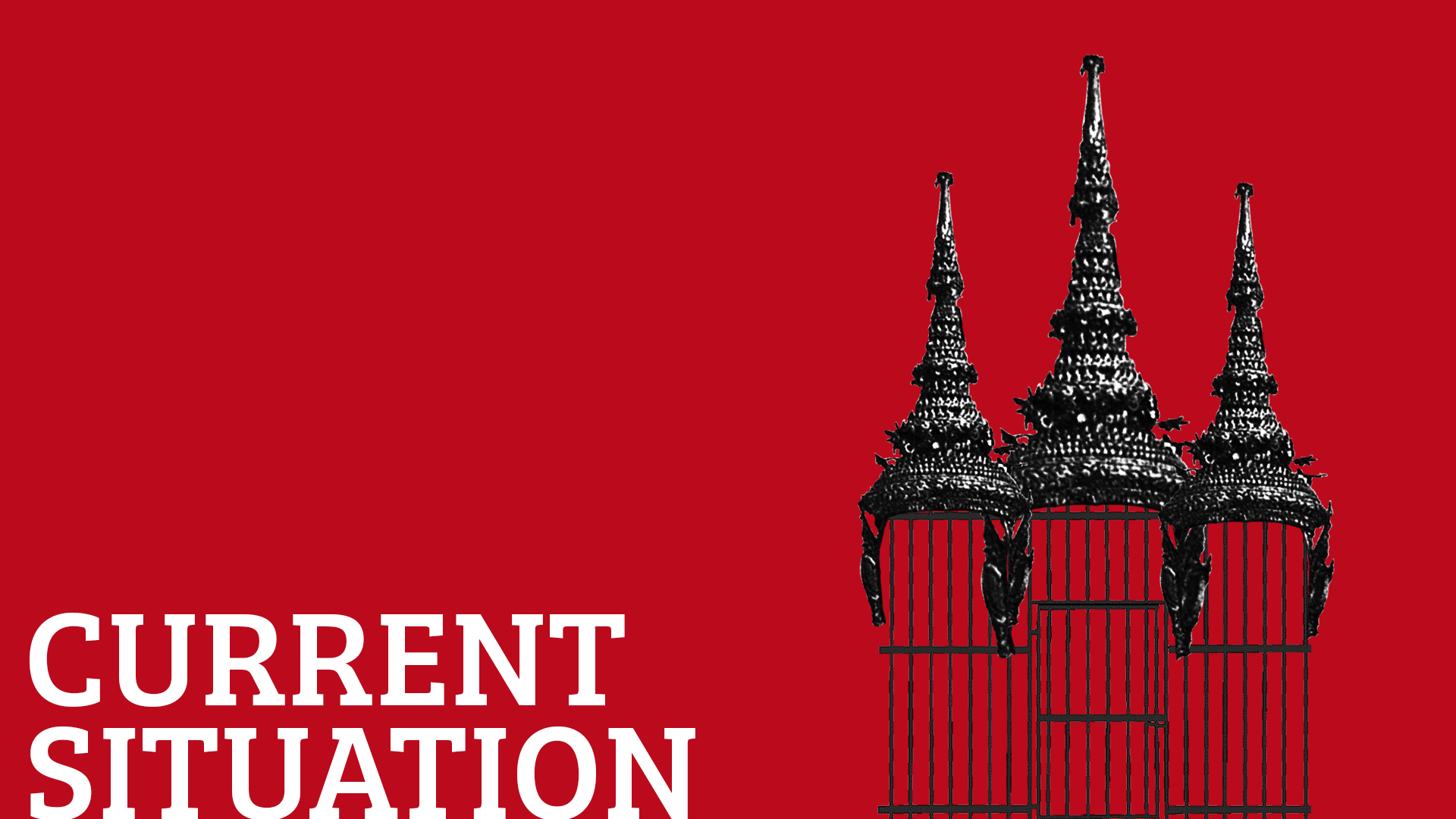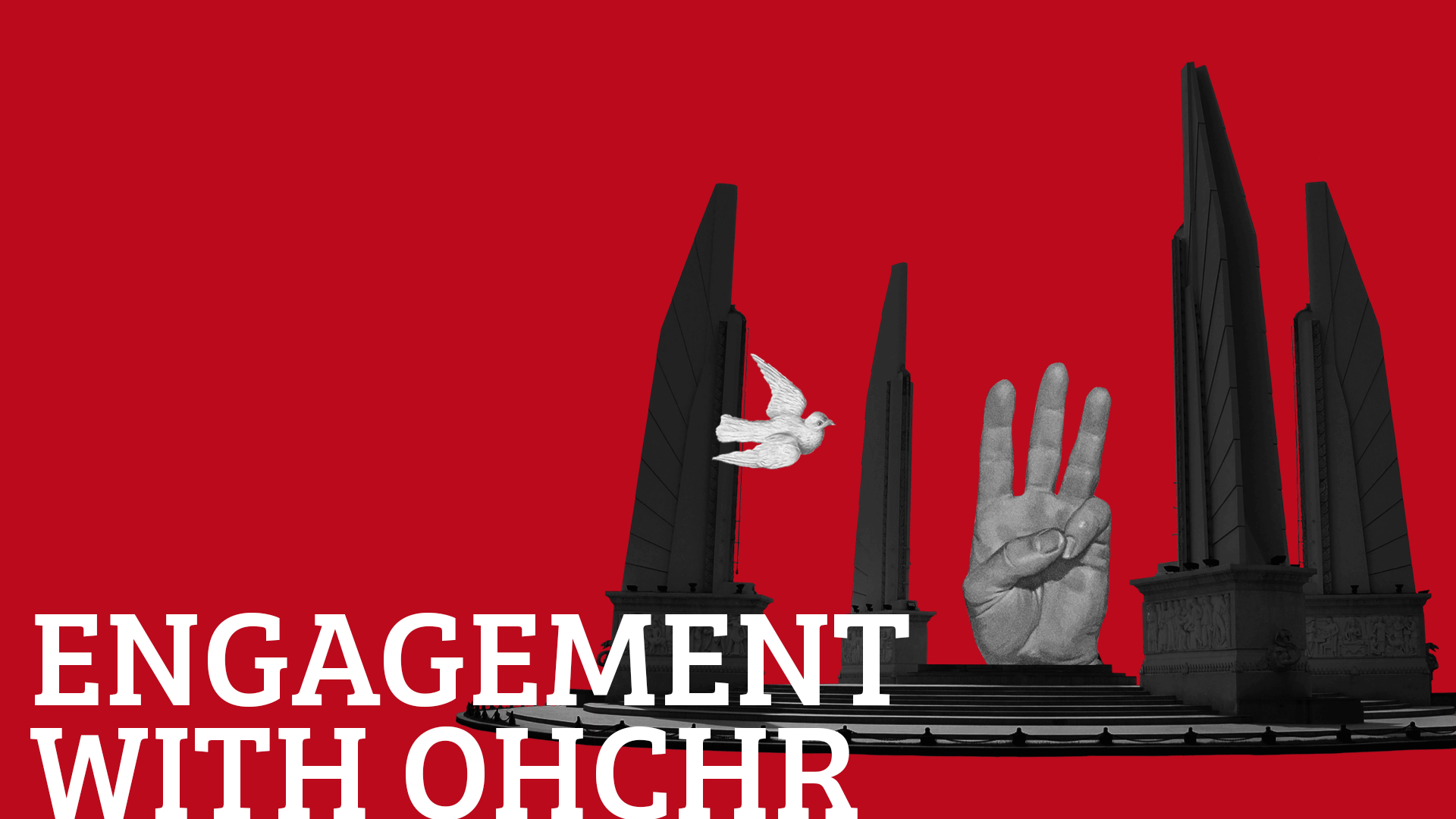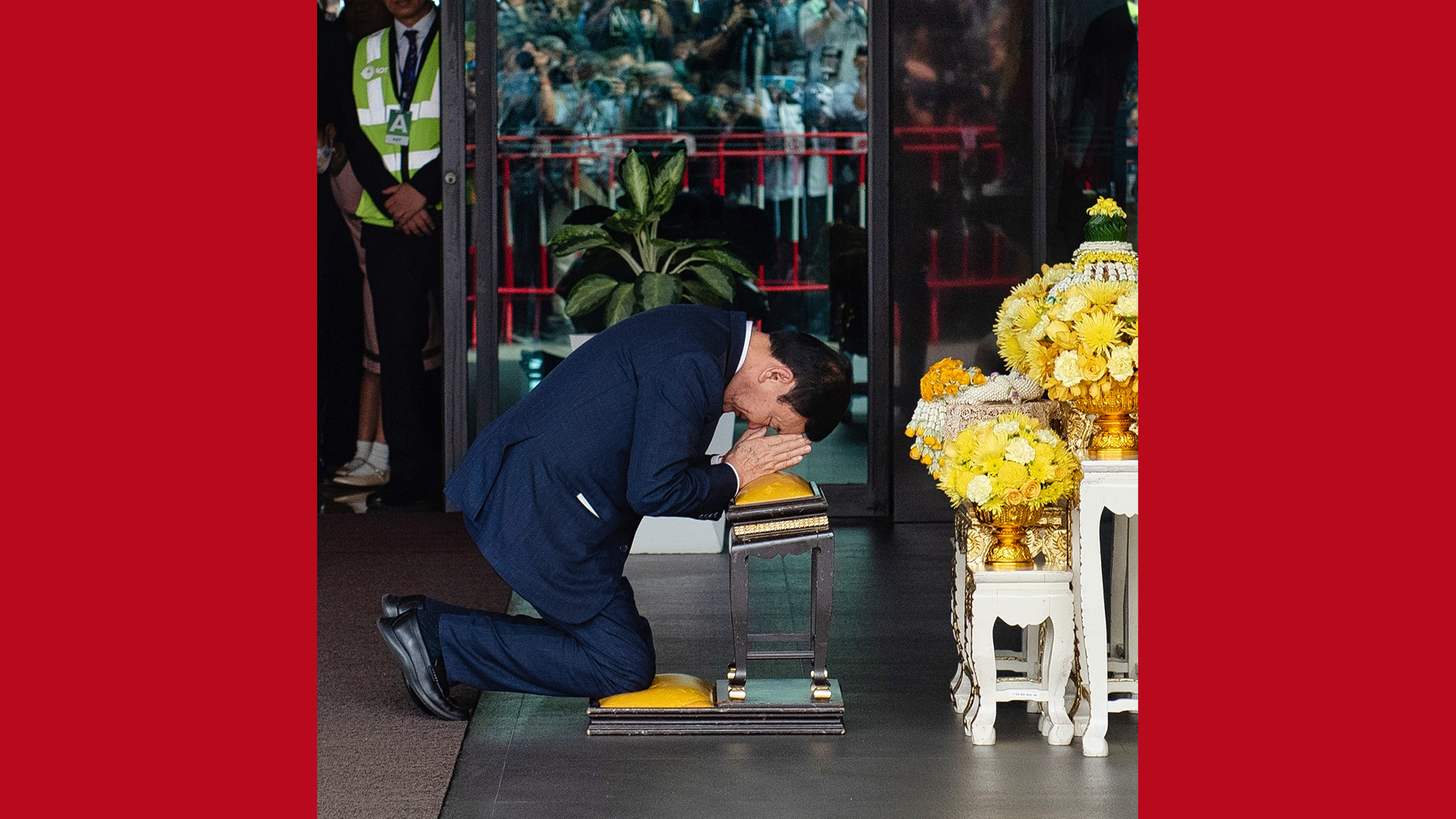
Banner: BANGKOK, THAILAND August 22, 2023: Thailand's former PM Thaksin Shinawatra, accused of Corruption arrives at Don Mueang International Airport, to fight his own lawsuit. After 17 years in exile abroad. Photo: teera.noisakran, Shutterstock
Thaksin’s Orban-esque Grip on Thai Democracy
Thaksin Shinawatra's political evolution in Thailand mirrors Viktor Orban's authoritarian playbook in Hungary, raising alarm bells for democratic advocates.
September 7, 2024
Thaksin Shinawatra’s shift from populist icon to strongman strategist, now facing Section 112 Lèse Majesté charges, is raising concerns about a Viktor Orban-style erosion of Thai democracy. This common thread looms large over Thailand's political landscape, on his recent actions bear striking similarities to Orban’s autocratic approach, where populism evolved into centralised power and weakened democratic institutions. Thaksin’s legal challenges and political maneuvers suggest a potential move toward authoritarianism, echoing Hungary's trajectory. The parallels between these leaders' transformations signal a potential erosion of democratic processes, with Thaksin's maneuvers potentially inflicting lasting damage on Thailand's democratic foundations, much as Orban's actions have in Hungary.
From Populist Darling to Democracy's Demise?
Thaksin Shinawatra's political evolution in Thailand mirrors Viktor Orban's authoritarian playbook in Hungary, raising alarm bells for democratic advocates. Once a populist icon, Thaksin's recent machinations suggest a disturbing shift towards autocracy, threatening to reshape Thailand's governance and potentially irreparably damage its democratic foundations.
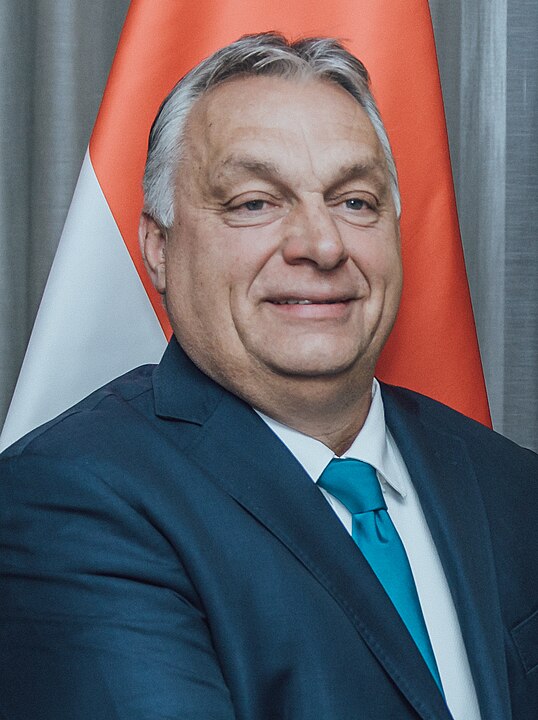
Thaksin’s career has been marked by both triumphs and controversies. His initial tenure as Prime Minister, which ended abruptly with a military coup in 2006, was characterised by populist policies that garnered strong support from Thailand’s rural and working-class populations. These policies, reminiscent of Orban’s early approach in Hungary, combined economic interventions aimed at improving the lives of ordinary citizens with strong nationalist rhetoric. However, like Orban, Thaksin’s time in office was also marred by allegations of corruption, cronyism, and abuse of power, ultimately leading to his ouster and the dissolution of his Thai Rak Thai Party.
The subsequent political chapters in Thailand further illustrate the Shinawatra family’s enduring influence and Thaksin’s behind-the-scenes manoeuvring. The rise of his sister, Yingluck Shinawatra, to the premiership under the banner of the Pheu Thai Party demonstrated the family’s ability to maintain a grip on power through proxy figures – a strategy not dissimilar to how Orban has positioned loyal allies in key government and business positions in Hungary. Yingluck’s government, like her brother’s, ended with a military coup in 2014, underscoring the cyclical nature of Thailand’s political instability and the military’s recurring role in governance.
The Family Affair: Nepotism or Strategic Genius
Thaksin's latest power play involves positioning his daughter, Paetongtarn Shinawatra, as Prime Minister. This move, reminiscent of Orban's efforts to create a political dynasty, blurs the lines between family interests and national governance. By surrounding himself with loyalists and family members, Thaksin seems to prioritise personal power over democratic principles. The appointment of Paetongtarn, despite her lack of political experience, raises serious questions about the motivations behind this decision and its potential impact on Thai governance.
When Yesterday's Enemies Become Today's Allies— In a surprising turn of events, Thaksin has begun forging alliances with former adversaries, including the Democrat Party. This pragmatic approach to power consolidation echoes Orban’s strategy of neutralising opposition through co-optation. The question remains: Is this political manoeuvring or the death knell of genuine opposition in Thailand?
Furthermore, the rigorous vetting of ministerial candidates to ensure loyalty to the Shinawatra family rather than competence or a public service record is a clear indication of prioritising personal power over good governance. This approach mirrors the tactics employed by Orban, who has been criticised for surrounding himself with loyalists and yes-men, effectively creating an echo chamber of power.
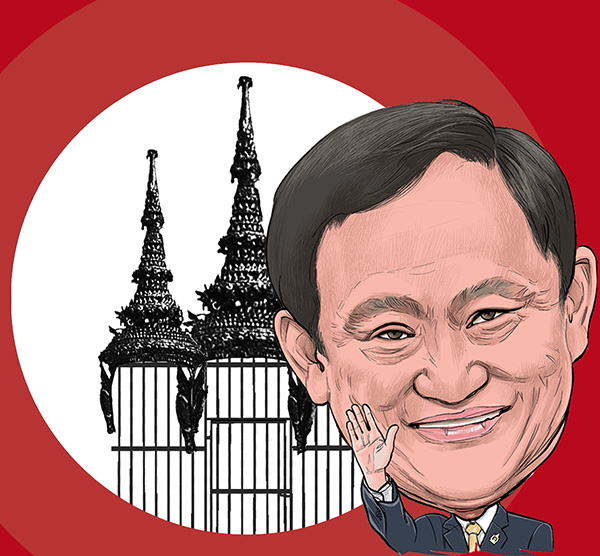
The Legal Labyrinth: Justice or a Weapon of Mass Suppression?
A crucial aspect of Thaksin's story is his unique status as a fugitive Prime Minister who has managed to evade numerous legal charges. This remarkable feat underscores the extent of his influence and the complexities of Thailand's legal and political systems. Recently, Thaksin has been charged with Lèse Majesté, a serious offense in Thailand. Interestingly, Thaksin suspects that Prawit Wongsuwan, a key political figure, may have played a role in downplaying these charges in an attempt to loosen Thaksin's grip on power.
However, the legal challenges facing Thaksin, and his family are far from over. Both Thaksin and his daughter, Paetongtarn Shinawatra, are expected to face a barrage of new charges. These are likely to be initiated by the Seriruam Thai Party, the Phalang Pracharat Party, and various independent politicians. The situation is particularly precarious for Paetongtarn, who, despite being positioned for a high-ranking political role, lacks any experience in politics, having never served even a single term as a member of parliament.
The parallels with Orban's Hungary are striking here. While the specific legal challenges differ, both leaders have faced accusations of manipulating the legal system to their advantage, using it as a tool to consolidate power and suppress opposition. The complex web of charges, counter-charges, and political manoeuvring in Thailand echoes the erosion of judicial independence seen in Hungary under Orban's rule.
The potential long-term consequences of Thaksin’s strategic shift are profound and deeply troubling. Thailand’s multi-party system, already fragile, faces the risk of becoming a mere theatrical performance, with real power concentrated in the hands of the Shinawatra family and their chosen allies. The independent media, civil society organisations, and opposition parties – all crucial components of a healthy democracy – may find themselves increasingly marginalised or co-opted into the new power structure, much as they have been in Hungary under Orban’s rule.
Moreover, this transformation of Thaksin’s political strategy poses significant challenges for Thailand’s international standing. As the country moves further away from democratic norms, it risks alienation from democratic allies and increased scrutiny from international organisations concerned with human rights and democratic governance. This could have far-reaching implications for Thailand’s economy, diplomacy, and regional influence, mirroring the international challenges faced by Hungary as a result of Orban’s autocratic tendencies.
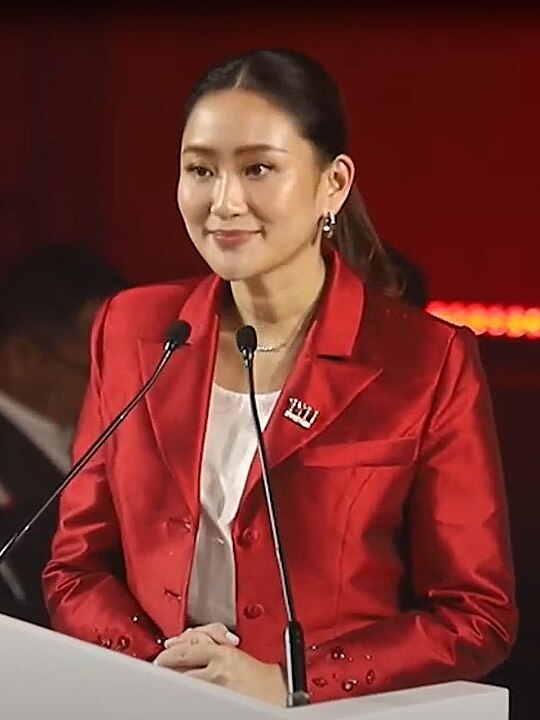
The response of the Thai people to this strategic shift will be crucial in determining the country’s political future. While Thaksin’s populist policies once garnered widespread support, particularly among rural and working-class Thais, his new autocratic leanings may test the limits of this loyalty. The question remains whether the Thai electorate will recognise and resist this slide toward autocracy or if the allure of stability and promised prosperity will outweigh concerns about democratic erosion – a dilemma that has faced Hungarian voters under Orban’s rule.
For those opposed to Thaksin’s new direction, the challenges are formidable. Traditional methods of political opposition may prove ineffective against a system increasingly rigged in favor of the ruling family. Novel approaches to civic engagement, grassroots organising, and international advocacy may be necessary to counteract the consolidation of power. The experiences of opposition movements in Hungary could provide valuable lessons for Thai activists and pro-democracy forces.
The role of Thailand’s military, long a powerful player in the country’s politics, adds another layer of complexity to this evolving situation. While the military has intervened in the past to remove both Thaksin and his sister from power, citing concerns about corruption and abuse of power, its future actions in the face of this new strongman strategy remain uncertain. The potential for military intervention looms as both a check on Thaksin’s ambitions and a threat to democratic governance in its own right – a dynamic not present in the Hungarian context but crucial to understanding the Thai political landscape.
In a nutshell, Thaksin Shinawatra’s transformation from populist leader to aspiring strongman represents a critical juncture in Thailand’s political evolution. The shift from policies aimed at broad popular appeal to strategies focused on consolidating power within a family dynasty signals a dangerous turn towards autocracy, one that bears striking similarities to Viktor Orban’s path in Hungary. This strategic pivot not only threatens the integrity of Thailand’s democratic institutions but also poses profound questions about the future of governance in Southeast Asia and the broader global context of democratic backsliding.
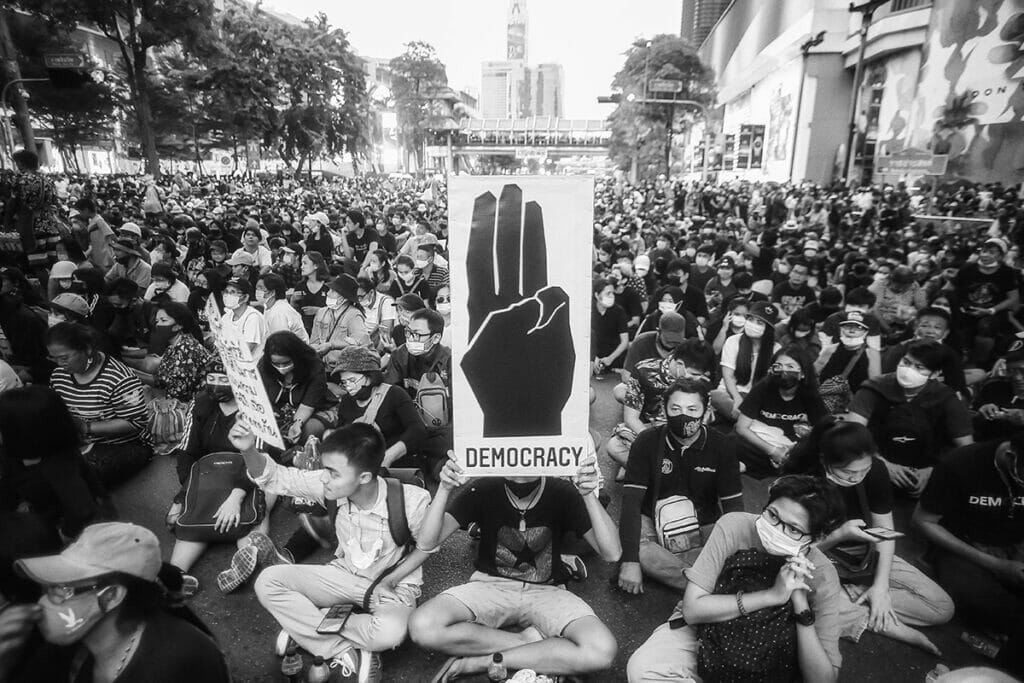
A Critical Juncture in Thailand’s Political Evolution?
As Thailand stands at this crossroads, the actions from political parties and civil society to the media and international community – will be crucial in determining whether the country succumbs to autocratic rule or finds a path back to genuine democratic governance. The coming years will likely be defined by this struggle between Thaksin’s autocratic ambitions and the resilience of Thailand’s democratic spirit.
However, the question remains: Can Thailand’s democracy survive Thaksin Shinawatra’s metamorphosis from populist champion to shadow strongman, or will it follow the path of democratic erosion seen in Orban’s Hungary? The answer will have profound implications not just for Thailand but for the broader narrative of democracy in the face of charismatic, adaptive autocrats worldwide. As this political drama unfolds, the world watches, waiting to see if Thailand will become another cautionary tale of democratic backsliding or a beacon of hope for those fighting to preserve the principles of representative governance against the tide of authoritarianism.
Prem Singh Gill
Prem Singh Gill is a Visiting Scholar at the Universitas Muhammadiyah Yogyakarta, Indonesia and a Visiting Scholar in Thammasat University

